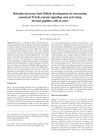2 citations,
January 2022 in “The Application of Clinical Genetics” A young Russian girl with Meier-Gorlin syndrome has two new mutations in the CDC6 gene.
 1 citations,
November 2023 in “iScience”
1 citations,
November 2023 in “iScience” A protein called desmoglein 3 is important for keeping hair follicle stem cells inactive and helps in their regeneration.
[object Object]  1 citations,
November 2022 in “International Journal of Molecular Sciences”
1 citations,
November 2022 in “International Journal of Molecular Sciences” Kelulut Honey can help regulate sex hormone receptors in rats with Polycystic Ovary Syndrome, similar to common medications.
 June 2024 in “International Journal of Nanomedicine”
June 2024 in “International Journal of Nanomedicine” CRISPR/Cas9 has improved precision and control but still faces clinical challenges.
 January 2023 in “Annals of dermatology/Annals of Dermatology”
January 2023 in “Annals of dermatology/Annals of Dermatology” A substance called miR-1246 may help treat severe hair loss by reducing certain immune cell activities.
 109 citations,
September 2011 in “Human molecular genetics online/Human molecular genetics”
109 citations,
September 2011 in “Human molecular genetics online/Human molecular genetics” New treatments targeting specific genes show promise for treating keratin disorders.
 June 2021 in “bioRxiv (Cold Spring Harbor Laboratory)”
June 2021 in “bioRxiv (Cold Spring Harbor Laboratory)” The gene Tfap2b is essential for creating a type of stem cell in zebrafish that can become different pigment cells.
 22 citations,
June 2012 in “PLOS ONE”
22 citations,
June 2012 in “PLOS ONE” Cholesterol-related compounds can stop hair growth and cause inflammation in a type of scarring hair loss.
 14 citations,
November 2014 in “European journal of medicinal chemistry”
14 citations,
November 2014 in “European journal of medicinal chemistry” Researchers found new potential treatments for conditions related to the androgen receptor, like male hormonal contraception, by testing thousands of compounds.
 421 citations,
January 2015 in “Chemical Society Reviews”
421 citations,
January 2015 in “Chemical Society Reviews” Improving artificial vascular grafts requires better materials and surface designs to reduce blood clotting and support blood vessel cell growth.
 11 citations,
January 2014 in “Egyptian Journal of Dermatology and Venereology”
11 citations,
January 2014 in “Egyptian Journal of Dermatology and Venereology” Women losing hair might have lower levels of vitamin D.
[object Object]  88 citations,
July 2014 in “Journal of the American Academy of Dermatology”
88 citations,
July 2014 in “Journal of the American Academy of Dermatology” Targeted cancer therapies often cause skin reactions, so dermatologists must manage these effects.
 1 citations,
September 2023 in “Clinical, cosmetic and investigational dermatology”
1 citations,
September 2023 in “Clinical, cosmetic and investigational dermatology” Certain genetic variants linked to immune response increase the risk of alopecia areata in Taiwanese people.
14 citations,
June 2021 in “Journal of dermatological science” Argan press cake extract might help grow hair and protect hair cells from damage and inflammation.
33 citations,
May 2018 in “Stem Cell Reports” Krt15+ cells in the mouse intestine resist radiation and can start tumors.
September 2022 in “International Journal of Impotence Research” Public interest in finasteride's sexual side effects has significantly increased.
 23 citations,
January 2018 in “International Journal of Molecular Medicine”
23 citations,
January 2018 in “International Journal of Molecular Medicine” Baicalin helps hair growth by activating specific cell signals and pathways.
 42 citations,
November 2002 in “The American journal of pathology”
42 citations,
November 2002 in “The American journal of pathology” Distinct β-catenin patterns are linked to cell growth, not cell death, in lung cancer.
 11 citations,
March 2020 in “Immunology”
11 citations,
March 2020 in “Immunology” Human prenatal skin develops an immune network early on that helps with skin formation and healing without scarring.
 6 citations,
December 2020 in “Dermatological reviews”
6 citations,
December 2020 in “Dermatological reviews” COVID-19 may worsen with androgens; anti-androgen drugs could help.
 391 citations,
January 2010 in “Journal of The American Academy of Dermatology”
391 citations,
January 2010 in “Journal of The American Academy of Dermatology” Half of people with Alopecia Areata may see hair regrowth within a year without treatment, but recovery is unpredictable.
 139 citations,
February 2010 in “The journal of allergy and clinical immunology/Journal of allergy and clinical immunology/The journal of allergy and clinical immunology”
139 citations,
February 2010 in “The journal of allergy and clinical immunology/Journal of allergy and clinical immunology/The journal of allergy and clinical immunology” Transplant success has improved with better immunosuppressive drugs and donor matching.
 134 citations,
April 2020 in “Journal of Cosmetic Dermatology”
134 citations,
April 2020 in “Journal of Cosmetic Dermatology” Male pattern hair loss could hint at androgens affecting COVID-19 severity.
 123 citations,
May 2020 in “Drug Development Research”
123 citations,
May 2020 in “Drug Development Research” Men's sensitivity to male hormones might affect how severe COVID-19 gets for them.
 49 citations,
January 2021 in “Journal of The European Academy of Dermatology and Venereology”
49 citations,
January 2021 in “Journal of The European Academy of Dermatology and Venereology” Anti-androgens, like finasteride, dutasteride, and spironolactone, may lessen the severity of COVID-19 in men, leading to fewer ICU admissions.
 47 citations,
April 2020 in “Dermatologic Therapy”
47 citations,
April 2020 in “Dermatologic Therapy” Androgenetic alopecia linked to COVID-19 severity; drugs reducing androgen receptor activation may help.
 32 citations,
July 2020 in “Journal of The American Academy of Dermatology”
32 citations,
July 2020 in “Journal of The American Academy of Dermatology” AGA linked to worse COVID-19 outcomes in men.
 29 citations,
January 2009 in “Gynecological Endocrinology”
29 citations,
January 2009 in “Gynecological Endocrinology” Women with PCOS have higher levels of certain blood clotting factors, suggesting a greater risk of cardiovascular issues.
 25 citations,
March 2018 in “Clinics in Dermatology”
25 citations,
March 2018 in “Clinics in Dermatology” Indigenous herbal medicines in the Indian subcontinent have potential for drug development but need more research and standardization.
 23 citations,
June 2003 in “Journal of Investigative Dermatology Symposium Proceedings”
23 citations,
June 2003 in “Journal of Investigative Dermatology Symposium Proceedings” Alopecia Areata is an autoimmune disease affecting hair follicles, influenced by genetic and environmental factors, with rodent models being essential for research.

























